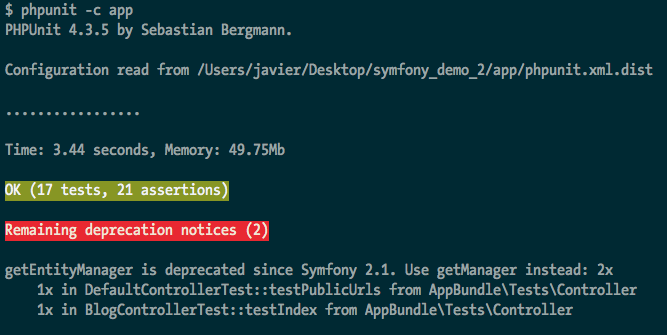New in Symfony 2.7: PHPUnit Bridge
April 28, 2015
•
Published by
![]() Javier Eguiluz
Javier Eguiluz
Warning: This post is about an unsupported Symfony version. Some of this information may be out of date. Read the most recent Symfony Docs.
In computer science, the bridge pattern is meant to "decouple an abstraction from its implementation so that the two can vary independently". The bridge uses encapsulation, aggregation and can use inheritance to separate responsibilities into different classes.
Symfony defines several bridges to abstract third-party libraries such as Doctrine, Monolog, Swiftmailer and Twig. In Symfony 2.7 we added a new bridge for PHPUnit. This first version of the bridge provides the following features:
- It disables PHP's garbage collector for tests to avoid segmentation faults;
- It auto registers the needed classes to load Doctrine annotations;
- It reports a summary of deprecation notices at the end of the test suite.
The last feature is very useful for Symfony developers that are preparing the transition to Symfony 3. First, install the new PHPUnit bridge in your application executing the following command:
1
$ composer require --dev "symfony/phpunit-bridge":2.7.x@betaThen, execute the test suite and you'll see a report of the deprecated Symfony features that your application is still using:

By default, deprecation notices will make tests fail. This behavior can be
controlled with the SYMFONY_DEPRECATIONS_HELPER environment variable (default
value = strict). Change the value of that variable to weak to make the
bridge ignore deprecation notices. This is useful for projects that must use
deprecated interfaces for backward compatibility reasons.
In addition, you can safely mark a test as legacy using any of the following methods:
- Make its class start with the
Legacyprefix; - Make its method start with
testLegacy; - Make its data provider start with
provideLegacyorgetLegacy; - Add the
@grouplegacy annotation to its class or method.
Help the Symfony project!
As with any Open-Source project, contributing code or documentation is the most common way to help, but we also have a wide range of sponsoring opportunities.
Comments are closed.
To ensure that comments stay relevant, they are closed for old posts.
It disables PHP's garbage collector for tests to avoid segfaults (defaults)